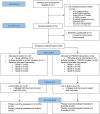A Pilot Randomized Trial of an Obesity Prevention Program for High-Risk Infants in Primary Care
- PMID: 36314374
- PMCID: PMC10167925
- DOI: 10.1093/jpepsy/jsac075
A Pilot Randomized Trial of an Obesity Prevention Program for High-Risk Infants in Primary Care
Abstract
Objective: Rapid infant weight gain is associated with later obesity. Novel interventions to prevent rapid infant weight gain that are accessible to infants and families are needed, especially for those at the highest risk. Our aims were to examine: (a) feasibility and acceptability of a responsive parenting intervention delivered via Integrated Behavioral Health (IBH) in pediatric primary care and (b) preliminary effects on infant weight gain from birth to 6 (post-treatment) and 9 (follow-up) months.
Methods: A parallel design, proof-of-concept randomized control trial was conducted with 65 mother-infant dyads (32 randomized to intervention, 33 randomized an IBH attention control focused on promoting healthy mental health), in which the majority identify as Black (80%) and low income (91% receiving Medicaid). Participants and assessors were masked to treatment condition. Outcomes included feasibility (enrollment), acceptability (retention and adherence), and conditional weight gain (CWG), an indicator of rapid weight gain.
Results: The intervention was feasible (90% of eligible families enrolled) and acceptable (89% of families retained), with 81% receiving ≥3 of 4 treatment sessions. A medium effect was found on CWG (d = -0.54 post-treatment, d = -0.57 follow-up), with the infants in the treatment group showing significantly lower CWG (mean = -0.27, 95% CI, -0.63, 0.09) compared to the control group (mean = 0.29, 95% CI, -0.17, 0.76) at 9 months (p = .04).
Conclusions: This study demonstrates the feasibility of implementing a responsive parenting obesity prevention intervention within primary care. Delivery in pediatric primary care is advantageous for implementation and reaching at-risk populations. The preliminary effects on CWG are promising and support testing in a larger trial.
Keywords: Integrated Behavioral Health; communities of color; health disparities and inequities; low-income families; obesity prevention; responsive parenting.
© The Author(s) 2022. Published by Oxford University Press on behalf of the Society of Pediatric Psychology. All rights reserved. For permissions, please e-mail: journals.permissions@oup.com.
Figures
References
-
- Alexander A., Dowling D., Furman L. (2010). What do pregnant low-income women say about breastfeeding? Breastfeeding Medicine, 5(1), 17–23. - PubMed
-
- Baughcum A. E., Burklow K. A., Deeks C. M., Powers S. W., Whitaker R. C. (1998). Maternal feeding practices and childhood obesity: A focus group study of low-income mothers. Archives of Pediatrics & Adolescent Medicine, 152(10), 1010–1014. - PubMed
Publication types
MeSH terms
Grants and funding
LinkOut - more resources
Full Text Sources
Medical


